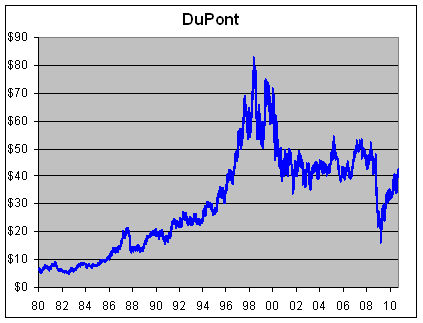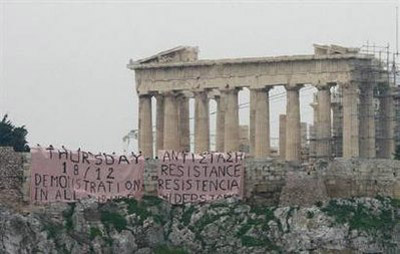-
Poll Shows Investors Distrust
Posted by Eddy Elfenbein on September 14th, 2010 at 9:46 amThe latest poll run by CNBC and AP shows widespread investor distrust of the stock market. Here are some bullets:
61% said the market’s recent volatility has made them less confident about buying and selling individual stocks.
55% said the market is fair only to some investors.
More than 60% said they had paid attention to news reports about swings in the stock market.
Among those with assets of at least $250,000, more than half blamed computerized trading for the big swings, compared with about a third of those with a net worth of less than $50,000.
Nearly 90% of those with portfolios of less than $50,000 said the market is unfair to small investors.
More than 75% of investors worth at least $250,000 say the market is unfair to the little guy.
Just 8% expressed strong confidence in regulators. Half expressed little or no confidence, including 16% with no confidence at all.
Asked to rate six investment options as a way to build wealth, mutual funds were the favorite, with 62% calling them a good investment.
ETFs finished at the bottom, endorsed by just over a quarter of those polled. About half had no feelings either way about these funds.
Drawing the highest number of negative reviews were real estate and savings accounts. Both were considered bad investments by about 1 in 4 people.
About three quarters of those earning at least $100,000 annually rated mutual funds as good investments, compared with 58% of those making less than $50,000.
As for individual stocks, more than 60% of investors with assets of $250,000 or more favored them, compared with less than half of those worth under $50,000.
Sixty percent of those with investments worth less than $50,000 liked savings accounts, compared with 35% with assets of $250,000 and up.
Nearly 80% of those surveyed said the best way to make money in the stock market is to buy stocks and hold them for a long time before selling. -
Morning News: September 14, 2010
Posted by Eddy Elfenbein on September 14th, 2010 at 9:12 amOracle to Acquire Major IT Services Firm, In Our Opinion
5 Little-Known Facts About Social Security
Why stocks are likely heading higher
Yen Rises to 15-Year High on Kan Hopes; Asian Stocks Fluctuate
Beware starting trade war, China economist tells U.S.
Bunds Extend Gain After ZEW Shows Investor Confidence Drop; Yield at 2.37% -
Quick Notes
Posted by Eddy Elfenbein on September 13th, 2010 at 4:08 pmToday was a big day for small-caps. While the S&P 500 (^SPX) was up by 1.11%, the S&P Small-Cap 600 (^SML) and Russell 2000 (^RUT) were up by 2.36% and 2.49% respectively.
Gold is up to $1,245.10. When it hits $1,250 that it means it’s an even $20,000 a pound.
Eighteen of the 20 stocks on the Buy List closed higher today. The Buy List was up 1.53% today and it’s up 2.35% for the year.
Today was the 82nd day in a row that the S&P 500 closed between 1020 and 1130, but we’re getting close to the upper bound. We’re just 0.53% from our highest close in 17 weeks. -
The Fed’s Gold Stash
Posted by Eddy Elfenbein on September 13th, 2010 at 1:35 pmAlea brings up a very good point. The Federal Reserve’s gold holdings are marked at a price of $42.22 an ounce by law. The current market price is about $1250 an ounce.
According to Alea, going to mark-to-market “would force the Federal Reserve to disgorge more than $300 billion in exceptional profits to the Treasury. Germany did it 13 years ago, no reason for the US not to follow.” -
DuPont Hits new 52-Week High
Posted by Eddy Elfenbein on September 13th, 2010 at 12:51 pmJust a quick note on DuPont (DD). Here’s another good example of a boring company that can be a great buy.

Back when the world blew up, the stock dropped as low as $16 a share. But let’s look at the recent earnings trend. Last quarter, DD beat Wall Street’s forecast by 24%. The quarter before that, they beat by 17%. Then by “just” 7%. But the two before that were earnings beats of 36% and 15%. That’s a great run.
When the last earnings report came out, DuPont raised their full-year guidance range from $2.50 to $2.70 per share to $2.90 to $3.05 per share. That’s a hefty increase.
In June, DuPont’s CFO spoke of the company’s bold goals:Fanandakis reaffirmed the company’s commitment to deliver about 20 percent compound annual earnings growth for the 2009-2012 periods. By executing on priorities, DuPont expects to generate about 10 percent top-line compound annual growth for the 2009-2012 periods. As previously disclosed, the company also plans to capture $1 billion in fixed cost productivity and $1 billion in working capital productivity gains during the 2010-2012 timeframe.
-
AFLAC’s Strange Ride
Posted by Eddy Elfenbein on September 13th, 2010 at 10:48 amThis is shaping up to be a very good morning. All 20 Buy List stocks are up. AFLAC (AFL) has been as high as $52.35 which is the highest price in over four months.
By the way, let’s take a step back and laugh at Wall Street for a moment. AFLAC reported Q2 earnings-per-share of $1.35 on July 27. That was two cents better than expectations. In April, they said to expect Q2 to range between $1.33 and $1.38 per share. In other words, this last earnings report was hardly a major surprise.
Yet, how did AFLAC’s shares respond to the earnings report? They sold off! The stock closed at $50.41 on July 27. The next day, they dropped 2.3%. By late August, the stock was off by more than 12%. Then, suddenly, everything turned around. AFLAC not only gained back everything it lost but it’s actually higher than where it was before the earnings report. This makes no sense. There’s been no critical news between then and now. We’ve simply seen traders push a staid stock down and up by a few billion dollars for really no reason. Remember that next time you place a buy order. -
Morning News: September 13, 2010
Posted by Eddy Elfenbein on September 13th, 2010 at 10:06 amWhy Some Gloomy Investors are Bullish on Stocks
Bank Stocks Climb as Basel Gives Firms Eight Years to Comply
At Goldman, Partners Are Made, and Unmade
Asian Shares Gain on Economic Optimism
Geithner Urges Action on Economy
Consumers Will Pay More for Goods They Can Touch
U.S. Debt Fund Shuns Dubai World Debt Deal
The Era of Expert Failure -
Greece: “The Country Sank the Banks”
Posted by Eddy Elfenbein on September 12th, 2010 at 4:09 pm
I strongly urge you to read Michael Lewis’ very long article in Vanity Fair on the massive disaster called the Greek economy. Here’s a sample:Moody’s, the ratings agency, had just lowered Greece’s credit rating to the level that turned all Greek government bonds into junk—and so no longer eligible to be owned by many of the investors who currently owned them. The resulting dumping of Greek bonds onto the market was, in the short term, no big deal, because the International Monetary Fund and the European Central Bank had between them agreed to lend Greece—a nation of about 11 million people, or two million fewer than Greater Los Angeles—up to $145 billion. In the short term Greece had been removed from the free financial markets and become a ward of other states.
That was the good news. The long-term picture was far bleaker. In addition to its roughly $400 billion (and growing) of outstanding government debt, the Greek number crunchers had just figured out that their government owed another $800 billion or more in pensions. Add it all up and you got about $1.2 trillion, or more than a quarter-million dollars for every working Greek. Against $1.2 trillion in debts, a $145 billion bailout was clearly more of a gesture than a solution. And those were just the official numbers; the truth is surely worse. “Our people went in and couldn’t believe what they found,” a senior I.M.F. official told me, not long after he’d returned from the I.M.F.’s first Greek mission. “The way they were keeping track of their finances—they knew how much they had agreed to spend, but no one was keeping track of what he had actually spent. It wasn’t even what you would call an emerging economy. It was a Third World country.”
As it turned out, what the Greeks wanted to do, once the lights went out and they were alone in the dark with a pile of borrowed money, was turn their government into a piñata stuffed with fantastic sums and give as many citizens as possible a whack at it. In just the past decade the wage bill of the Greek public sector has doubled, in real terms—and that number doesn’t take into account the bribes collected by public officials. The average government job pays almost three times the average private-sector job. The national railroad has annual revenues of 100 million euros against an annual wage bill of 400 million, plus 300 million euros in other expenses. The average state railroad employee earns 65,000 euros a year. Twenty years ago a successful businessman turned minister of finance named Stefanos Manos pointed out that it would be cheaper to put all Greece’s rail passengers into taxicabs: it’s still true. “We have a railroad company which is bankrupt beyond comprehension,” Manos put it to me. “And yet there isn’t a single private company in Greece with that kind of average pay.” The Greek public-school system is the site of breathtaking inefficiency: one of the lowest-ranked systems in Europe, it nonetheless employs four times as many teachers per pupil as the highest-ranked, Finland’s. Greeks who send their children to public schools simply assume that they will need to hire private tutors to make sure they actually learn something. There are three government-owned defense companies: together they have billions of euros in debts, and mounting losses. The retirement age for Greek jobs classified as “arduous” is as early as 55 for men and 50 for women. As this is also the moment when the state begins to shovel out generous pensions, more than 600 Greek professions somehow managed to get themselves classified as arduous: hairdressers, radio announcers, waiters, musicians, and on and on and on. The Greek public health-care system spends far more on supplies than the European average—and it is not uncommon, several Greeks tell me, to see nurses and doctors leaving the job with their arms filled with paper towels and diapers and whatever else they can plunder from the supply closets.
Where waste ends and theft begins almost doesn’t matter; the one masks and thus enables the other. It’s simply assumed, for instance, that anyone who is working for the government is meant to be bribed. People who go to public health clinics assume they will need to bribe doctors to actually take care of them. Government ministers who have spent their lives in public service emerge from office able to afford multi-million-dollar mansions and two or three country homes.
Oddly enough, the financiers in Greece remain more or less beyond reproach. They never ceased to be anything but sleepy old commercial bankers. Virtually alone among Europe’s bankers, they did not buy U.S. subprime-backed bonds, or leverage themselves to the hilt, or pay themselves huge sums of money. The biggest problem the banks had was that they had lent roughly 30 billion euros to the Greek government—where it was stolen or squandered. In Greece the banks didn’t sink the country. The country sank the banks. -
Crossing Wall Street Nine Years Ago
Posted by Eddy Elfenbein on September 11th, 2010 at 1:39 pm
-
Happy Birthday, Maria
Posted by Eddy Elfenbein on September 11th, 2010 at 10:41 amThe Money Honey turns 43.

- Tweets by @EddyElfenbein
-
-
Archives
- September 2024
- August 2024
- July 2024
- June 2024
- May 2024
- April 2024
- March 2024
- February 2024
- January 2024
- December 2023
- November 2023
- October 2023
- September 2023
- August 2023
- July 2023
- June 2023
- May 2023
- April 2023
- March 2023
- February 2023
- January 2023
- December 2022
- November 2022
- October 2022
- September 2022
- August 2022
- July 2022
- June 2022
- May 2022
- April 2022
- March 2022
- February 2022
- January 2022
- December 2021
- November 2021
- October 2021
- September 2021
- August 2021
- July 2021
- June 2021
- May 2021
- April 2021
- March 2021
- February 2021
- January 2021
- December 2020
- November 2020
- October 2020
- September 2020
- August 2020
- July 2020
- June 2020
- May 2020
- April 2020
- March 2020
- February 2020
- January 2020
- December 2019
- November 2019
- October 2019
- September 2019
- August 2019
- July 2019
- June 2019
- May 2019
- April 2019
- March 2019
- February 2019
- January 2019
- December 2018
- November 2018
- October 2018
- September 2018
- August 2018
- July 2018
- June 2018
- May 2018
- April 2018
- March 2018
- February 2018
- January 2018
- December 2017
- November 2017
- October 2017
- September 2017
- August 2017
- July 2017
- June 2017
- May 2017
- April 2017
- March 2017
- February 2017
- January 2017
- December 2016
- November 2016
- October 2016
- September 2016
- August 2016
- July 2016
- June 2016
- May 2016
- April 2016
- March 2016
- February 2016
- January 2016
- December 2015
- November 2015
- October 2015
- September 2015
- August 2015
- July 2015
- June 2015
- May 2015
- April 2015
- March 2015
- February 2015
- January 2015
- December 2014
- November 2014
- October 2014
- September 2014
- August 2014
- July 2014
- June 2014
- May 2014
- April 2014
- March 2014
- February 2014
- January 2014
- December 2013
- November 2013
- October 2013
- September 2013
- August 2013
- July 2013
- June 2013
- May 2013
- April 2013
- March 2013
- February 2013
- January 2013
- December 2012
- November 2012
- October 2012
- September 2012
- August 2012
- July 2012
- June 2012
- May 2012
- April 2012
- March 2012
- February 2012
- January 2012
- December 2011
- November 2011
- October 2011
- September 2011
- August 2011
- July 2011
- June 2011
- May 2011
- April 2011
- March 2011
- February 2011
- January 2011
- December 2010
- November 2010
- October 2010
- September 2010
- August 2010
- July 2010
- June 2010
- May 2010
- April 2010
- March 2010
- February 2010
- January 2010
- December 2009
- November 2009
- October 2009
- September 2009
- August 2009
- July 2009
- June 2009
- May 2009
- April 2009
- March 2009
- February 2009
- January 2009
- December 2008
- November 2008
- October 2008
- September 2008
- August 2008
- July 2008
- June 2008
- May 2008
- April 2008
- March 2008
- February 2008
- January 2008
- December 2007
- November 2007
- October 2007
- September 2007
- August 2007
- July 2007
- June 2007
- May 2007
- April 2007
- March 2007
- February 2007
- January 2007
- December 2006
- November 2006
- October 2006
- September 2006
- August 2006
- July 2006
- June 2006
- May 2006
- April 2006
- March 2006
- February 2006
- January 2006
- December 2005
- November 2005
- October 2005
- September 2005
- August 2005
- July 2005
 Eddy Elfenbein is a Washington, DC-based speaker, portfolio manager and editor of the blog Crossing Wall Street. His
Eddy Elfenbein is a Washington, DC-based speaker, portfolio manager and editor of the blog Crossing Wall Street. His